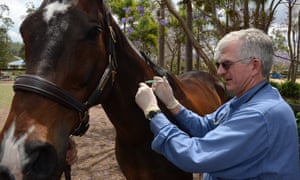Extract from The Guardian
There has been a spike in people refusing to vaccinate pets against deadly diseases, including some that can infect humans
Sam
Kovac can’t say for sure what prompted it, but in the past few weeks
the Sydney veterinarian has been faced with the same alarming, beguiling
question over and over: “Will this vaccination give my dog autism?”
“It’s actually ridiculous. I mean you hear chatter over the years, but just in these last few weeks it’s really, really ramped up,” he tells Guardian Australia.
“Most of the time people are OK, they’re not staunchly against it once you tell them the science and the statistics [but] we have had people walk out in hysteria, saying that there is absolutely no way their dog is getting [vaccinated] because they believe it causes auto-immune diseases or, specifically, autism.”
Kovac is so perturbed by the trend that he felt moved to speak out about it in Sydney’s Daily Telegraph this week, saying he didn’t believe anti-vaxxers deserved to have animals as pets if they were willing to put them at risk of diseases such as canine parvovirus.
“They are sentencing their dog to death from one of the most shocking, horrible viruses you can imagine,” he says.
“If a disease as contagious, as horrific and with a high mortality
rate as parvovirus existed for humans, this conversation would be so
different.”“It’s actually ridiculous. I mean you hear chatter over the years, but just in these last few weeks it’s really, really ramped up,” he tells Guardian Australia.
“Most of the time people are OK, they’re not staunchly against it once you tell them the science and the statistics [but] we have had people walk out in hysteria, saying that there is absolutely no way their dog is getting [vaccinated] because they believe it causes auto-immune diseases or, specifically, autism.”
Kovac is so perturbed by the trend that he felt moved to speak out about it in Sydney’s Daily Telegraph this week, saying he didn’t believe anti-vaxxers deserved to have animals as pets if they were willing to put them at risk of diseases such as canine parvovirus.
“They are sentencing their dog to death from one of the most shocking, horrible viruses you can imagine,” he says.
Vaccinations do not cause autism in dogs or humans. But there is an important distinction: there is no such thing as autism in dogs.
“Well, there are certainly no recorded cases of animals with the condition that I know of,” Kovac says. “And there is no diagnostic test to check for it in dogs or cats anyway.”
This year the World Health Organisation included “vaccine hesitancy” among its 10 biggest threats to global health, pointing to a 30% increase in the number of cases of measles worldwide and a “resurgence” of the disease in countries that were close to eliminating it.
In March, the head of Britain’s National Health Service, Simon Stevens, blamed “fake news” by “vaccination deniers” on social media for a tripling in measles cases in the UK in 2018. In December a Guardian investigation pointed to the way populist rightwing politicians in Europe and the US were capitalising on the mistrust of vaccine science.
In 2015 Donald Trump wrongly linked vaccination schedules to autism in a debate during the Republican primaries, while in Australia One Nation leader Pauline Hanson was forced to apologise in 2017 after she asserted that the government’s vaccination policies amounted to blackmail.
But are our four-legged friends really the latest front in the anti-vaccination movement’s war?
Naomi Smith, a sociologist from the Federation University in Victoria, has published research mapping out the anti-vaccination movement’s presence on social media by trawling through hundreds of thousands of posts and comments on popular anti-vaccination Facebook pages.

“Well, no, they didn’t, but what was really interesting is that after we published I got emails from vets saying we have seen this in our space too,” she tells Guardian Australia.
“So it didn’t come up in our data but it’s definitely something I’ve heard about since, because people have approached me about it.”
Most concerning was an email from an equine veterinarian in Queensland, who told Smith he continually faced reluctance from anti-vaxxers opposed to the Hendra virus vaccine.
The Hendra vaccine is not without critics – last year horse owners from New South Wales and Queensland launched a class action against the pharmaceutical company responsible for developing it, claiming it did not provide adequate warnings about potential side effects. But Paula Parker, the president of the Australian Veterinary Association, believes much of the opposition to the virus is based on “bad-faith” arguments.
“There are unfortunately some people making bad-faith arguments about Hendra, and some who get into internet rabbit holes and come out misinformed, it’s heartbreaking to us because it’s an amazing vaccine for a disease which is life-threatening to horses and humans,” Parker says.
She too is aware of a broader reluctance among a small number of pet owners to vaccinate, and sees a link with the flourishing market for “holistic” animal care, which she says “anecdotally seem to breed some reluctance to vaccinations or other conventional treatments”.

For Smith, too, there is a clear link between the so-called wellness industry and the spread of anti-vaccination messaging.
“What’s super interesting about the wellness movement, or industry, is that anyone can talk about it, you don’t have to have any kind of credentials, and it seems to be that those conversations naturally lead to a suspicion of established bio-medical practices,” she says.
Smith points to the example of Taylor Winterstein, wife of the Penrith Panthers NRL player Frank Winterstein, who claims vaccines cause allergies and believes parents are being “bullied” by GPs who “pressure” them to give their children vaccinations.
The Daily Telegraph reported last month that Winterstein was charging $200 for “informative” workshops, teaching other parents about her views.
Winterstein told the paper she had “never once said not to vaccinate”, but added: “Vaccines are not safe and effective for everyone, a ‘one size fits all’ schedule does not fit all bio-individual children and where there is risk there must always be choice.”
Smith is critical of that approach: “You’ve got footballers’ wives holding anti-vaccination seminars and their credentials are essentially being very good looking, which somehow means they’re speaking to some deeper truth that they understand what it is to be healthy,” he says.
“We’re very food- and diet-obsessed in this culture and people are constantly looking for advice about how to be healthy, which is fine, but that’s not all that these people are selling.”
That the anti-vaccination movement would turn its attention to animals is unsurprising to Smith.
“This attitude towards, I say this in quotation marks, ‘bodily and dietary purity’, is being translated by people into their pets because we view pets as part of the family now,” she says.
“So if you’re taking on the attitude that you’re going to keep your family, again, quote-unquote, ‘safe’, why wouldn’t you extend it to your dog too?”

No comments:
Post a Comment